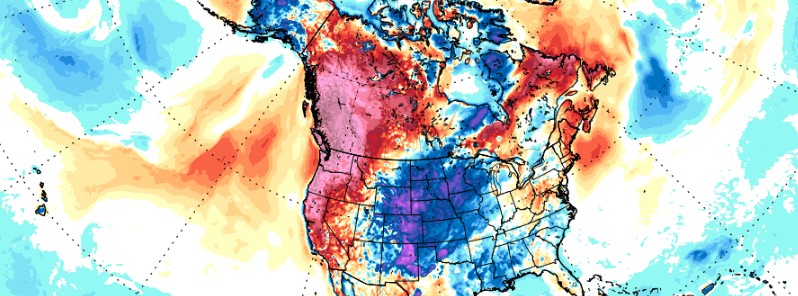Exceptionally dangerous, historic heat wave to engulf Pacific Northwest this weekend

An exceptionally dangerous and potentially record-breaking heatwave is expected this weekend across the Pacific Northwest and western Canad. The US National Weather Service (NWS) warned of fire weather concerns across the Northern Great Basin and Northern California, while Environment Canada issued warnings covering most of British Columbia.
- This will be an exceptionally dangerous heatwave from a public health perspective, especially since this is a part of the country where structures are not designed to shed heat and where air conditioning is rare. Infrastructure/ power disruption is also possible — climate scientist Daniel Swain.
A high-pressure dome is forming over the upper northwest and Canada, similar to the atmospheric conditions that brought punishing heat in California and Southwest U.S. last week, said the NSW.
"This will be setting the stage for the beginning of a potential historic heat wave for the Northwest this weekend," it stated in issuing excessive heat watches for parts of Oregon, California, and Washington state.
"While record high temperature is not expected over the next two days over the Northwest, the high temperatures will still be 10 to 20 °F [5 – 11 °C] above average and lead into the weekend when numerous record highs are likely."
NSW warned that high temperatures can be dangerous, advising residents to stay indoors and care for children, pets, and the elderly. The heat could also cause strained power grids in some states.
Areas of Washington state and Oregon will face a high risk of excessive heat, particularly over the weekend, June 26 and 27. Heat-related illnesses are possible, especially for residents without adequate air conditioning.
"The projected temperatures on Sun-Mon across Pacific Northwest are so extreme that I think folks are having difficulty putting them into context. There remains some uncertainty, but places along the I-5 corridor from Medford to Seattle have the potential to shatter all-time records," wrote climate scientist Daniel Swain.
"This will be an exceptionally dangerous heatwave from a public health perspective, especially since this is a part of the country where structures are not designed to shed heat and where air conditioning is rare. Infrastructure/ power disruption is also possible."
Record-Breaking and Dangerous Heatwave coming to the West. Over 80 sites are forecast to break daily high temperature records starting this weekend. All-time June monthly records could also be broken in some locations in the Pacific Northwest. https://t.co/L4FyvSS6lj pic.twitter.com/ouyIvWG3Fd
— NWS Weather Prediction Center (@NWSWPC) June 23, 2021
The "persistent" amplified ridge over British Columbia is key, b/c it takes multiple rounds of downslope mixing to boost sensible heat fluxes resulting in this heatwave.
Each successive day 850-hPa temps increase over the heat dome until max anomalies are +25C above normal! pic.twitter.com/XD7HekVfoV
— Philippe Papin (@pppapin) June 24, 2021
Projected temperatures on Sun-Mon across PacNW are so extreme that I think folks are having difficulty putting them into context. There remains some uncertainty, but places along I-5 corridor from Medford to Seattle have potential to *shatter* all-time records. #ORwx #WAwx pic.twitter.com/W9yr7XXxLF
— Daniel Swain (@Weather_West) June 23, 2021
Meanwhile, almost all of British Columbia is under a heat warning as dangerously high temperatures are forecast until next week.
The Environment Canada issued warnings covering much of the province, except for pockets in the northwest, southeast, and along Vancouver Island's central and west coast.
"The duration of this heat wave is concerning as there is little relief at night with elevated overnight temperatures. This record-breaking heat event will increase the potential for heat-related illnesses and increase the risk of wildfires due to drought conditions," it said.
The heat wave is the result of an "exceptionally strong" ridge of high pressure, Environment Canada reiterated.
Featured image credit: TropicalTidbits, GFS

Is any one willing yet to accept the revelation?